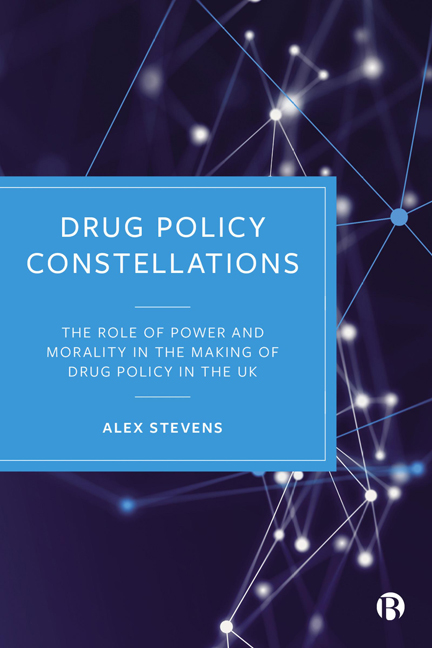Book contents
- Frontmatter
- Dedication
- Contents
- List of Figures and Tables
- About the Author
- Preface
- 1 An Introduction to Drug Policy Constellations
- PART I Contexts, Concepts and Methods for Studying Drug Policy Constellations
- PART II Morality and Power in UK Drug Policy Constellations
- PART III Cases in Drug Policy Making in the UK
- Notes
- References
- Index
4 - Policy Constellation: A Critical Realist Approach
- Frontmatter
- Dedication
- Contents
- List of Figures and Tables
- About the Author
- Preface
- 1 An Introduction to Drug Policy Constellations
- PART I Contexts, Concepts and Methods for Studying Drug Policy Constellations
- PART II Morality and Power in UK Drug Policy Constellations
- PART III Cases in Drug Policy Making in the UK
- Notes
- References
- Index
Summary
The policy constellations approach brings together social theory with concepts from the study of policy processes and a ‘social network perspective’ to ‘focus on how the constellation of relationships in networks may facilitate and constrain’ the resources that policy actors bring to the policy process. Such a perspective ‘move[s] from a primary focus on the individual and the attributes of that actor, to understanding the more dynamic supports and constraints of the larger social infrastructure’ (Finnigan et al, 2021, p 131). This infrastructure includes the social structures of power and wealth, as well as the cultural structures of morality.
I built the policy constellations approach using the theoretical tools of critical theory and critical realism. I do not want to take readers too deeply into these conceptual labyrinths, but I provide short guides to them in Online Appendix 4.1 (on critical realism) and 4.2 (on the critical study of ideology). Here I give even shorter summaries of these theoretical frameworks.
The policy constellations approach is distinct from the most commonly used, neo-pluralist theories of the policy process because it provides a critical framework which avoids methodological individualism. It identifies the forms of power and morality that operate at the level of social and cultural structures and uses them to explain how policy making works. It is not a revolution in thinking about these processes which seeks to repudiate all existing accounts. Rather, it incorporates many of the ideas that have been developed in previous research on the topic and brings them into a new theoretical framework. This creates more powerful explanations by bringing a wider range of phenomena into its scope and going deeper towards an understanding of the generative mechanisms that underlie the actual events and actions that occur in policy making.
Critical frameworks for policy analysis: a very brief introduction
In developing the policy constellations approach, I used four key features of critical realism (Bhaskar, 1975; Collier, 1994; Sayer, 2000, 2011; Archer et al, 2017). These are:
• Ontological realism: the belief that there is a real world that exists before we come to study or apprehend it. This is the opposite of ontological constructivism, which suggests that there is no reality that exists before we perceive it, that reality is constructed through our perceptions of it.
- Type
- Chapter
- Information
- Drug Policy ConstellationsThe Role of Power and Morality in the Making of Drug Policy in the UK, pp. 33 - 41Publisher: Bristol University PressPrint publication year: 2024

